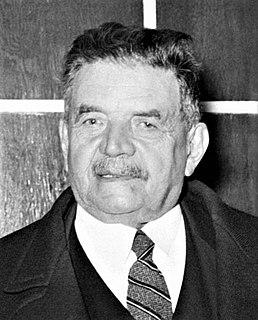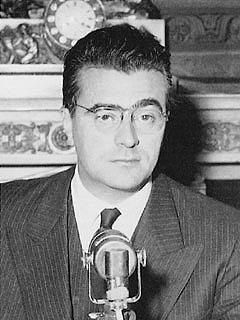
Jean-Pierre Raffarin is a French politician who served as Prime Minister of France from 6 May 2002 to 31 May 2005.

Édouard Marie Herriot was a French Radical politician of the Third Republic who served three times as Prime Minister and for many years as President of the Chamber of Deputies. He was leader of the first Cartel des Gauches.

Félix Gaillard d'Aimé was a French Radical politician who served as Prime Minister under the Fourth Republic from 1957 to 1958. He was the youngest head of a French government since Napoleon.

Paul Ramadier was a politician and a French statesman.
Ilunga is a relatively common personal name in the Democratic Republic of the Congo.

The prime minister of the Democratic Republic of the Congo is the head of government of the Democratic Republic of the Congo. The Constitution of the Third Republic grants the Prime Minister a significant amount of power.

The Government of the Democratic Republic of the Congo is the second institution in the central executive branch of the Democratic Republic of the Congo, the first institution being the President, who has the title of head of state.

The Republic of Cameroon is a decentralized unitary state.
Adolphe Lumanu Mulenda Bwana N’sefu, born on 5 September 1952 in Kabinda, Lomami Province, Democratic Republic of the Congo, is a politician.

The Belgo-Congolese Round Table Conference was a meeting organized in two parts in 1960 in Brussels between on the one side representatives of the Congolese political class and chiefs and on the other side Belgian political and business leaders. The round table meetings led to the adoption of sixteen resolutions on the future of the Belgian Congo and its institutional reforms. With a broad consensus, the date for independence was set on June 30, 1960.

General elections were held in the Democratic Republic of the Congo on 30 December 2018, to determine a successor to President Joseph Kabila, as well as for the 500 seats of the National Assembly and the 715 elected seats of the 26 provincial assemblies. Félix Tshisekedi (UDPS) won with 38.6% of the vote, defeating another opposition candidate, Martin Fayulu, and Emmanuel Ramazani Shadary, backed by the ruling party PPRD. Fayulu alleged that the vote was rigged against him in a deal made by Tshisekedi and outgoing President Kabila, challenging the result in the DRC's Constitutional Court. Different election observers, including those from the country's Roman Catholic Church, also cast doubt on the official result. Nonetheless on 20 January the Court rejected his appeal and declared Tshisekedi as the winner. Parties supporting President Kabila won the majority of seats in the National Assembly. Félix Tshisekedi was sworn in as the 5th President of the Democratic Republic of the Congo on 24 January 2019, making it the first peaceful transition of power in the country since it became independent from Belgium in 1960.
Alphonse Ilunga or Ilunga Dibwe Luakamanyabo is a Congolese politician.

Félix Antoine Tshisekedi Tshilombo is a Congolese politician who has been the President of the Democratic Republic of the Congo since 25 January 2019. He is the leader of the Union for Democracy and Social Progress (UDPS), the DRC's oldest and largest party, succeeding his late father Étienne Tshisekedi in that role, a three-time Prime Minister of Zaire and opposition leader during the reign of Mobutu Sese Seko. Tshisekedi was the UDPS party's candidate for president in the December 2018 general election, which he was awarded, despite accusations of irregularities from several election monitoring organisations and other opposition parties. The Constitutional Court of the DRC upheld his victory after another opposition politician, Martin Fayulu, challenged the result, but Tshisekedi has been accused of making a deal with his predecessor, Joseph Kabila. The election marked the first peaceful transition of power since the state became independent from Belgium in 1960.
Sylvestre Ilunga Ilunkamba is a Congolese politician who was appointed as the Prime Minister of the Democratic Republic of the Congo in May 2019, formally establishing his government in August 2019. He has had a long political career going back to the 1970s, having held a number of ministerial cabinet posts, and was previously a professor at the University of Kinshasa since 1979. Ilunga has also been the secretary general of Congo's national railway company. He has a reputation as an experienced public servant and technocrat, as well as an ally of former President Joseph Kabila.
Events in the year 2021 in the Democratic Republic of the Congo.

Marie Tumba Nzeza is a Congolese politician and diplomat. She served as the Minister of Foreign Affairs of the Democratic Republic of Congo in Prime Minister Sylvestre Ilunga's cabinet from September 2019 to April 2021. Previously, she was deputy secretary general of the Union for Democracy and Social Progress (UDPS), responsible for foreign affairs.

Jacqueline Penge Sanganyoi is a Congolese politician from the Democratic Republic of the Congo.

The Prime Minister of the Democratic Republic of the Congo Jean-Michel Sama Lukonde assumed the office on 15 February 2021. He announced his cabinet on 12 April 2021.
Irène Esambo Diata is a human rights lawyer and politician in the Democratic Republic of Congo. Herself a woman with a disability, in 2019 Esambo became DRC's first minister for people with disabilities. In the 2021 Lukonde government she kept her place in cabinet, as Minister-delegate to the Minister of Social Affairs, in charge of the Disabled and Other Vulnerable Persons.
The Cabinet of Benin is appointed by the President of the Republic and is subject to the opinion of the Bureau of the National Assembly.











